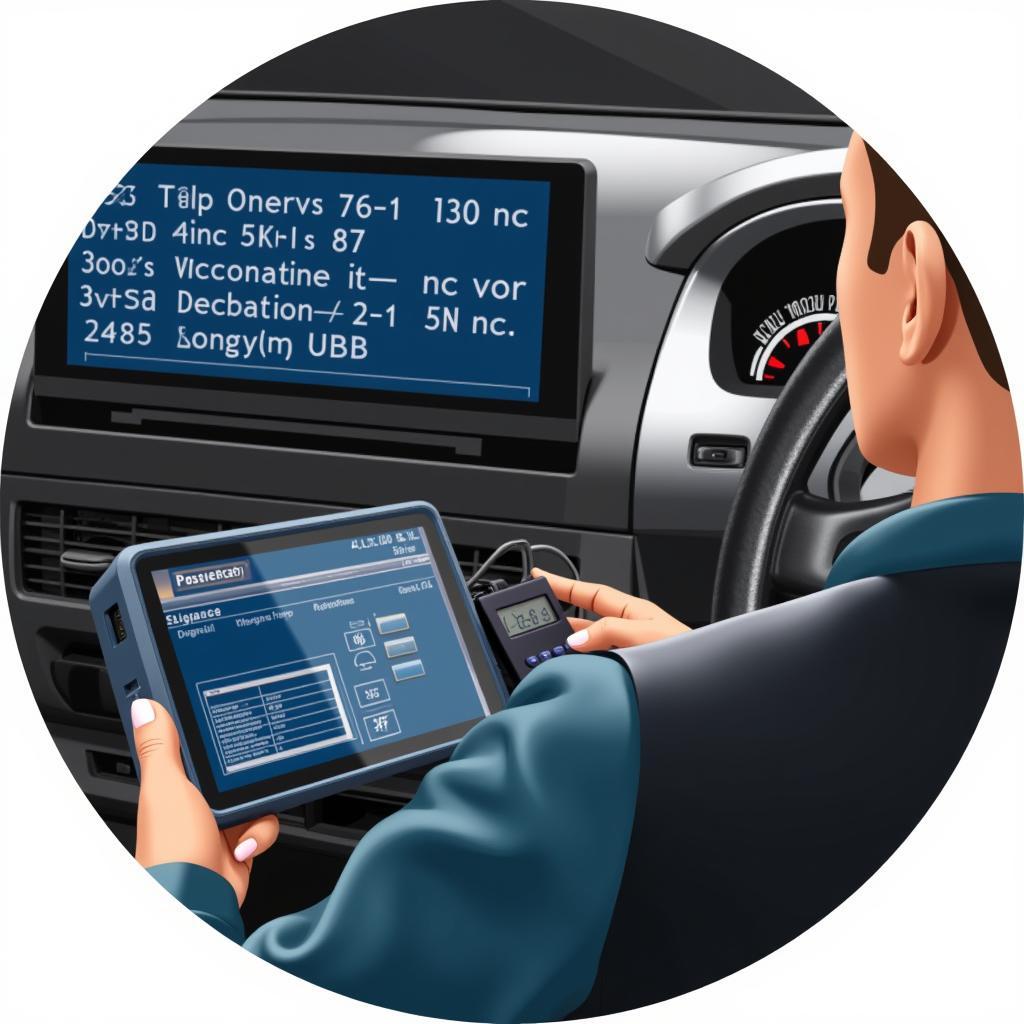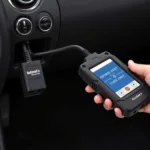Modern vehicles are increasingly complex, integrating intricate systems and electronic components that demand specialized knowledge for maintenance and repair. This is where a diagnostics test on car comes into play. A car diagnostic test is an electronic inspection that unveils the health of your vehicle’s various systems by communicating with its onboard computer. It’s akin to giving your car a thorough health checkup, providing valuable insights into potential issues and aiding in effective troubleshooting.
Understanding the Importance of a Diagnostics Test on Car
While traditional methods might involve visually inspecting components and relying on mechanic intuition, a car diagnostics test offers a more accurate and efficient approach. It dives deep into the vehicle’s systems, revealing hidden problems that might go unnoticed otherwise.
Here’s why a diagnostics test is crucial for car owners:
- Early Detection of Issues: The test can identify minor problems before they escalate into major (and costly) repairs.
- Accurate Diagnosis: It pinpoints the root cause of a problem, eliminating guesswork and unnecessary component replacements.
- Improved Safety: By identifying issues with brakes, airbags, or other safety-critical systems, a diagnostic test ensures your vehicle remains safe to drive.
- Increased Resale Value: A clean bill of health from a diagnostics test can boost your car’s value when selling or trading in.
When Should You Get a Diagnostics Test on Car?
While regular maintenance checks are essential, several scenarios signal the need for a diagnostics test:
- Illuminated Check Engine Light: This is the most obvious sign that your car requires a diagnostics test. The light could signal anything from a loose gas cap to a more serious engine problem.
- Unusual Noises or Smells: Any unusual noises (grinding, clicking, knocking) or strange smells (burning, sulfur) emanating from your vehicle warrant a diagnostics test.
- Performance Issues: Experiencing problems with starting, acceleration, fuel efficiency, or overall vehicle performance could indicate underlying issues best diagnosed with a test.
- Post-Accident Inspection: After an accident, a diagnostics test can reveal hidden damage to your car’s electronic systems.
- Used Car Purchase: Before purchasing a used car, a diagnostics test is crucial to ensure you are not inheriting hidden problems.
What Does a Diagnostics Test on Car Cover?
A car diagnostics test can access a wide range of vehicle systems, including:
- Engine and Transmission: This includes checking for misfires, fuel/air ratio problems, and transmission issues.
- Emissions System: The test evaluates the performance of catalytic converters, oxygen sensors, and other emission-related components.
- Braking System: It checks for problems with the ABS, brake fluid levels, and other braking system components.
- Airbag System: The test ensures the airbag system is functioning correctly and ready to deploy in case of an accident.
- Other Systems: A diagnostics test can also reveal issues with the steering, suspension, lighting, and other electronic modules in your car.
Types of Car Diagnostic Tools
There are various types of car diagnostic tools available, catering to both professional mechanics and car enthusiasts:
- Handheld Scanners (OBD-II Scanners): These portable devices plug into your car’s OBD-II port and display diagnostic trouble codes (DTCs) along with their descriptions.
- Advanced Scan Tools: Used by professional mechanics, these tools offer more in-depth analysis, including live data streams, actuator tests, and advanced programming functions.
- Smartphone Apps: Several mobile apps connect to your car’s OBD-II port via a Bluetooth adapter and provide basic diagnostic information.
How to Choose the Right Diagnostics Test on Car
Selecting the appropriate diagnostics test and tool depends on your needs and budget.
- For Basic Diagnostics: A handheld OBD-II scanner is sufficient for reading and clearing basic trouble codes.
- For In-depth Analysis: If you require advanced functionality like live data and actuator tests, consider an advanced scan tool.
- For DIY Enthusiasts: Smartphone apps offer a convenient and affordable way to monitor your car’s health.
Tips for Performing a Diagnostics Test on Car
- Locate the OBD-II Port: This port is usually located under the dashboard on the driver’s side.
- Connect the Diagnostic Tool: Plug the scanner or adapter into the OBD-II port.
- Turn on the Ignition: Turn the ignition to the “on” position (without starting the engine).
- Read the Codes: Follow the instructions on the scanner or app to read the diagnostic trouble codes (DTCs).
Interpreting Diagnostic Trouble Codes (DTCs)
DTCs are alphanumeric codes that represent specific car problems. They are standardized across most vehicles. You can usually find their descriptions in the scanner’s manual or online.
Note: Clearing DTCs without addressing the underlying issue will only provide a temporary fix.
Benefits of Regular Car Diagnostics Tests
- Preventative Maintenance: Regular tests help identify minor issues early on, preventing them from developing into major problems.
- Cost Savings: Catching problems early can save you significant money on costly repairs in the long run.
- Increased Vehicle Lifespan: Proper maintenance, guided by diagnostics tests, can extend the life of your vehicle.
- Peace of Mind: Knowing your car is in good health provides peace of mind and ensures a safer driving experience.
Frequently Asked Questions (FAQs)
Q: How much does a diagnostics test on car cost?
A: The cost can range from free at some auto parts stores to $100 or more at dealerships and mechanic shops. diagnostics test car cost
Q: Can I perform a diagnostics test on car myself?
A: Yes, with a basic OBD-II scanner or a smartphone app, you can perform basic diagnostics at home.
Q: What is the difference between a diagnostics test and a tune-up?
A: A diagnostics test identifies problems, while a tune-up involves adjusting and replacing parts to improve performance.
free car diagnostics test twickenham
Conclusion
A diagnostics test on car is no longer a luxury but a necessity in today’s world of technologically advanced vehicles. It’s an investment in your car’s health, your safety, and your wallet. Whether you’re experiencing car trouble, considering a used car purchase, or simply want to stay ahead of potential issues, a car diagnostics test provides invaluable insights to make informed decisions about your vehicle’s maintenance and repair.


